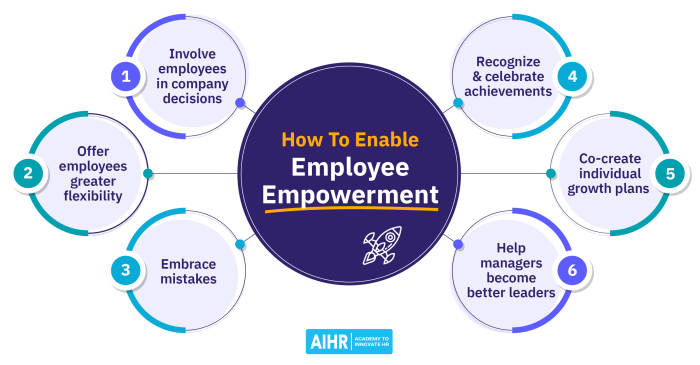Employee empowerment cannot be successful without clear and open communication. When employees are empowered, they are given the authority and responsibility to make decisions and take action on behalf of the organization. This can only be done effectively if employees have a clear understanding of their roles and responsibilities, as well as the expectations of their managers and the organization as a whole.
Clear and open communication is essential for creating a culture of empowerment. When employees feel comfortable sharing their ideas and concerns, they are more likely to be engaged and productive. They are also more likely to take ownership of their work and to be accountable for their results.
Employee Empowerment and Communication

Employee empowerment is a management strategy that gives employees the authority and responsibility to make decisions and take actions that affect their work. Clear and open communication is essential for successful employee empowerment. It allows employees to understand their roles, responsibilities, and expectations, and it provides them with the information they need to make informed decisions.
There are many ways that open communication can foster employee empowerment. For example, leaders can communicate clear expectations, provide employees with regular feedback, and encourage employees to share their ideas and suggestions. When employees feel that they are being heard and that their opinions are valued, they are more likely to feel empowered to take ownership of their work.
Leadership’s Role in Promoting Clear and Open Communication, Employee empowerment cannot be successful without clear and open
Leaders play a critical role in promoting clear and open communication in the workplace. They can do this by:
- Setting clear expectations and communicating them to employees
- Providing employees with regular feedback
- Encouraging employees to share their ideas and suggestions
- Creating a culture of trust and respect
Establishing Clear Expectations: Employee Empowerment Cannot Be Successful Without Clear And Open

Clear expectations are essential for employee empowerment. When employees know what is expected of them, they are more likely to feel confident in their ability to make decisions and take actions that will benefit the organization. There are a number of best practices for communicating expectations effectively:
- Be specific and clear about what you want employees to do.
- Communicate expectations in writing and verbally.
- Make sure that employees understand the rationale for the expectations.
- Provide employees with opportunities to ask questions and clarify expectations.
Unclear expectations can have a negative impact on employee empowerment. When employees do not know what is expected of them, they are more likely to feel uncertain and insecure. This can lead to decreased motivation, productivity, and job satisfaction.
Providing Resources and Support
Employees need access to the resources and support they need to be successful. This includes providing employees with the training, tools, and equipment they need to do their jobs effectively. It also includes providing employees with access to mentors, coaches, and other resources that can help them develop their skills and knowledge.
Organizations can provide resources and support in a number of ways. For example, organizations can:
- Offer training and development programs
- Provide employees with access to mentors and coaches
- Create a knowledge-sharing culture
- Provide employees with the tools and equipment they need to do their jobs effectively
Inadequate resources and support can have a negative impact on employee empowerment. When employees do not have the resources and support they need, they are less likely to feel confident in their ability to make decisions and take actions that will benefit the organization.
Fostering a Culture of Empowerment

A culture of empowerment is a culture in which employees feel that they are trusted, respected, and valued. In a culture of empowerment, employees are given the authority and responsibility to make decisions and take actions that affect their work.
They are also encouraged to share their ideas and suggestions, and they are recognized for their contributions.
There are a number of characteristics of a culture that supports employee empowerment. These characteristics include:
- Trust
- Respect
- Recognition
- Collaboration
- Innovation
Organizations can create a culture of empowerment by:
- Empowering employees to make decisions and take actions
- Encouraging employees to share their ideas and suggestions
- Recognizing employees for their contributions
- Creating a collaborative work environment
- Fostering innovation
Measuring and Evaluating Empowerment

It is important to measure and evaluate employee empowerment to ensure that it is having the desired impact on the organization. There are a number of metrics that can be used to assess employee empowerment. These metrics include:
- Employee satisfaction
- Employee engagement
- Employee productivity
- Employee turnover
- Customer satisfaction
Measuring and evaluating employee empowerment can be challenging. However, it is important to do so in order to ensure that employee empowerment is having the desired impact on the organization.
Top FAQs
What are the benefits of employee empowerment?
Employee empowerment can lead to increased employee engagement, productivity, and job satisfaction. It can also help to improve communication and collaboration within the organization.
What are the challenges of employee empowerment?
One of the biggest challenges of employee empowerment is ensuring that employees have the skills and knowledge they need to make good decisions. Another challenge is overcoming resistance from managers who are not comfortable giving up control.
How can organizations successfully implement employee empowerment?
Organizations can successfully implement employee empowerment by providing employees with clear expectations, resources, and support. They can also create a culture of empowerment by encouraging open communication and feedback.